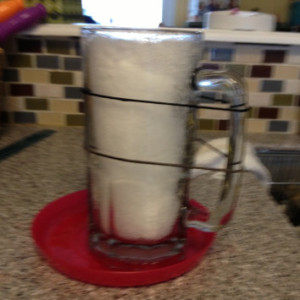Emergent Math has a blog post talking about how he and his daughter found an opportunity for physics on a snow day. They collected snow in a large cup and marked both their predictions of how much water there would be when it melted.

I won’t spoil the ending, you’ll have to go to his blog to see how accurate they were, but, before you click through, try to make a guess of your own.
At our rationality workshops, participants are greeted on day one with course booklets, schedules, and a bag of poker chips to encourage them to make bets. Chips are for making small side bets, but we also run a series of public prediction markets throughout the retreat.
Sometimes hilarity ensues (as when one participant wanted to set up a hedge against the bad bets he was afraid he’d make and asked me to create a market on whether the majority of his bets would have been wrong). But we include bet-making because we think it helps promote good rationality habits (the amusing stories are a positive externality).
In the case linked above, where the parent and the child bet on the snow, a bet keeps you accountable. It’s easy to imagine looking at the snow and saying something like “You know, this snow isn’t very dense. I bet when it would take up a lot less volume if it were melted,” and not ever going back to double check. You end up rewarding yourself for predictions that you don’t verify (your feeling of “Well, I was probably right" is the same feeling that caused you to make the original bet). When you bet, you know you’ll find out if you were right, so you get to check how well calibrated your confidence is.
And, in order to find out who’s right, you need to come up with a way to test your prediction, which forces you to think a little more concretely about the consequences of your predictions. More than once, two participants at a workshop have started setting up a bet but have had to scuttle the whole thing as it became clear they were anticipating the same result but framing it differently.
You can use a website like PredictionBook to track bets on your own, but it's a lot of fun to recruit friends and make it a game. Betting against someone will force you to make your assumptions and your predictions explicit and specific. Plus, you don't want to beat yourself up for making a lot of bad bets at first; you're in training, so it can be fun to compete to spot opportunities for bet (and thus opportunities to learn) instead of focusing too much on who wins them at first.


